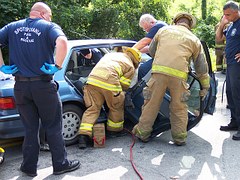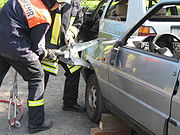Who Should I Talk To After A Car Accident? Do I Have To Call The Police? Should I Talk to The Other Insurance Company?
I have outlined in other guides suggested steps to take after an accident. One question that frequently comes up is who should you talk to, and who should you not talk to? You should speak to the following people:
- The investigating or responding officer, EMTs, or other medical personnel that respond, or that you see in the emergency room
- Any witnesses
- The other driver, but only to the limited extent of exchanging information, and possibly ascertaining their physical condition: are they okay, and do they need immediate medical attention.
- Your insurance company. NEVER the other person’s insurance company.
The first recommendation, of course ,is to talk to the involved responding officers. This necessarily assumes that officers come to investigate your motor vehicle -which isn’t always necessarily the case. While the law requires only an exchange of driver information in most instances, it is advisable to involve the police in any accident in order to create a record of what happened.
The full onset of symptoms of injuries sustained in automobile collisions can often be delayed.
If you’ve broken a bone or sustained a significant laceration- you’ll know right away. If the soft tissues in your body, particularly those in your neck or in your low back, have sustained trauma, you might not necessarily know it for a couple of days.

In fact, I’ve heard doctors say it’s not at all uncommon for symptoms to first appear 24 to 72 hours after the musculature of one’s neck or back sustains an impact. I would involve the police in instances where you intend to seek medical care, or at any time you think that medical care might become necessary. Keep in mind that you might not know the nature and extent of your injury-or indeed in some circumstances that you are injured at all- for a few days. I Attorney Eric T. Kirk can’t tell you the number of clients, but I’m certain it measures in the hundreds, that have told me over the years that “I felt a little shaken up after the accident, a little shocked, like my body was buzzing, but I thought I would be fine. I went home. I went to bed. I took some aspirin. But the next day, or a day or two later, when I went to go to work, I felt horrible.” The reality is it happens and it happens frequently. Minimally, the police should be involved in any accident:
- Involving personal injury or involving significant, visible property damage
- Involving the commission or the potential commission of a crime by one of the drivers, or
- In any accident in which you get or intend to get medical attention.

The same limitations would apply to conversations with any witnesses. Some witnesses volunteer and say “I saw everything that happened. I’ll be happy to testify for you” Others are a little more relaxed. Certainly you have to speak to someone to get their name, address, and contact information. I would limit discussion at this. One other note on witnesses. It might be advisable to speak to local business owners near the accident scene, or potentially local residents, if you believe there might be surveillance footage of the accident, how it occurred, or its aftermath.
You must speak to your insurance representative for a couple of purposes. You have an obligation to report a claim to your insurance company. You have the need for personal injury protection benefits, as well as a potential property damage claim. Your own insurance company needs basic indexing information in order to open such claims.
You should never speak to the insurance company for the other side. You should never speak to the insurance company for the other side.
That is not a typo. It’s that important. The insurance company is not your friend. They do not care if you were hurt or inconvenienced. They will use whatever you say against you. This is a conversation best had by your personal injury attorney.
In any conversation with any category of individual mentioned above, your comments should be strictly fact-based. I recommend you not giving any detail at all, or giving only information that is specifically asked for, and then only the facts. If speaking to an officer you of should answer that officer’s questions but answer that officer’s questions only with the facts of the accident. Never guess, speculate or surmise about what might have happened. The same rule would apply when speaking to your insurance claims adjuster.
I would offer an additional word of caution about speaking to medical providers, whether EMTs, first responders or hospital personnel. These are individuals that take their jobs seriously. Treat them with respect and courtesy. They are there to help you.
It might seem like common sense, but if you are not hurt, and there is no possibility that you are hurt, don’t call the ambulance, and don’t go to the emergency room.
If you are hurt, or believe that you may be hurt, have yourself checked out and give the medical personnel a full, complete and accurate history. Don’t exaggerate, but don’t minimize. I can tell you that cases have been lost based on what someone has told, or has not told, a triage nurse in an emergency room. Medical records are submitted into evidence in every personal injury claim. Medical records are scrutinized by defense lawyers, and by some judges, depending on the type of trial you may ultimately have. Certainly, a zealous defense attorney with years of experience in evaluating medical evidence is going to carefully scrutinize, parse through and cull pieces of information from your medical records that support any defense theory that you were, in fact, not insured. It is therefore vital that the information you provide to medical personnel is thorough and complete.
Under no circumstances should you get involved in any substantive conversation with the other driver at this juncture, beyond the narrow exceptions above.
One final note keep in mind then if your personal injury case ends up in litigation. Any statements that you make to other people are fair game. Keep in mind that if your personal injury case ends up in litigation, that any statements that you make to other friends, acquaintances, coworkers and the like may ultimately come out at a trial. These are your statements, so they could be offered into evidence, against you, if those out of court, casual statements are different than your trial testimony. Keep that in mind in discussing your claims or potential claims with others. I get calls on a daily basis from folks who were just involved in an automobile accident. I welcome these calls. It’s an uncertain, confusing time, and I’m happy to answer the questions that I can. I’d be proud to discuss your accident claim at no cost to you, at time and location of your choosing. Contact me today.



